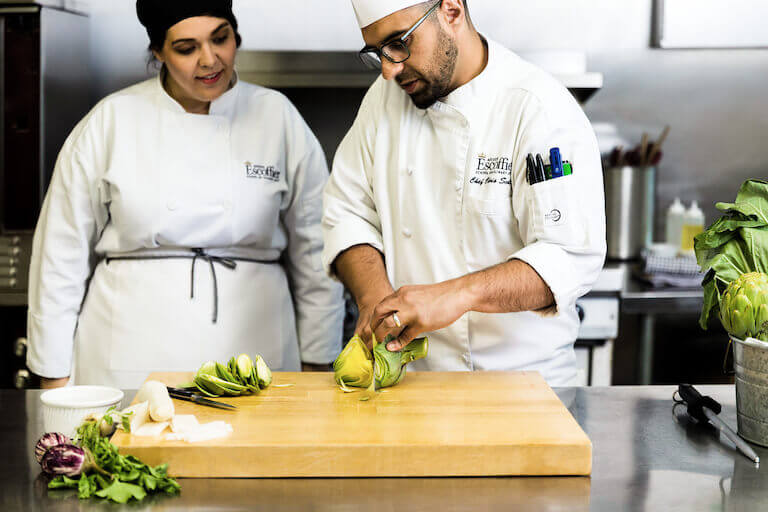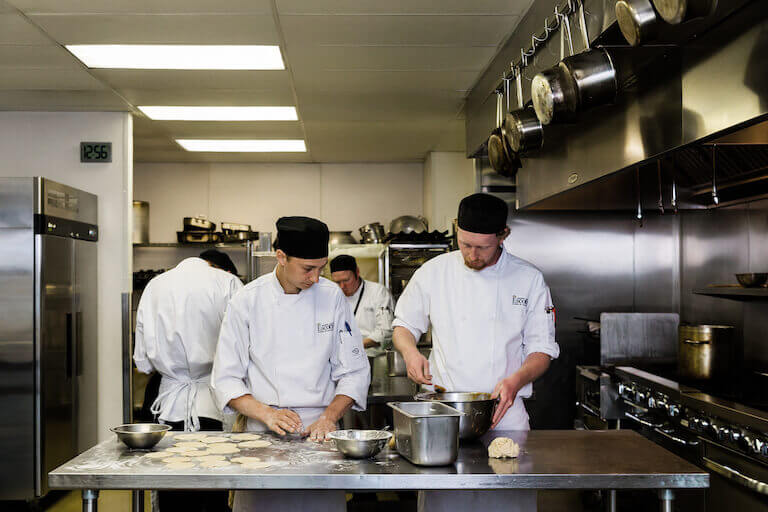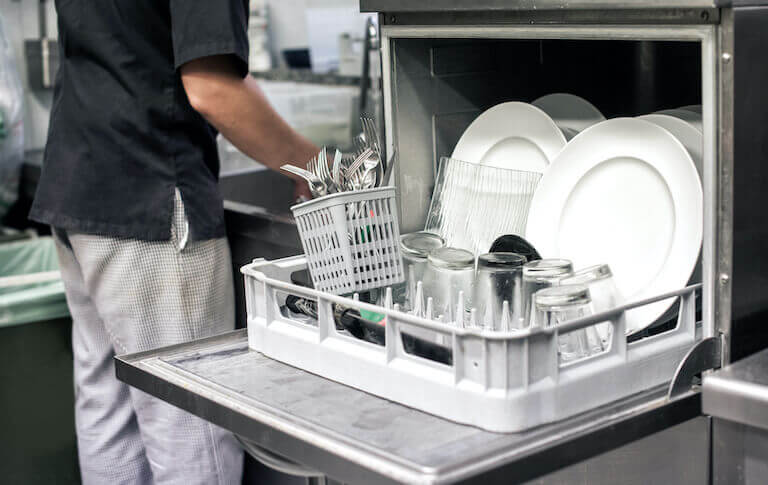Gearing up to take the next steps in your career? If you’re just starting out, or considering a career change to the culinary industry, you’re almost certainly going to hear some conflicting advice.
“Go to culinary school right away!”
“Learn on the job!”
“Go to school, but not until you’ve worked in the industry for at least a year!” (Or two years, or three years…)
We’re setting the record straight about going to culinary school with no experience, with a little experience, and with LOTS of experience.
Going to Culinary School With NO Experience—Will You Be Lost?
You arrive for your first day of culinary school. Your chef’s coat is so crisp it could stand up on its own. Your brand new chef’s knives have never been wielded. You’re as fresh and green as a scallion.
But what if the chef instructor puts you on the spot, law school-style, and asks you to demonstrate a technique with no warning?? What a nightmare!
Not to worry.
Here’s the truth: if you have no experience, but were admitted to the school anyway, then you’re not expected to have any experience. You’re ready for a culinary education just as you are.

In fact, there are some benefits to attending culinary school with a blank slate. You bring no preconceived notions, no bad habits, and nothing to “unlearn.” You might be surprised how many industry veterans have picked up outdated ideas or inefficient methods that waste valuable time. Changing ingrained habits is a challenge!
A high-quality culinary school curriculum like those offered from Auguste Escoffier School of Culinary Arts will be carefully crafted to build on previous lessons throughout the course. You’ll begin with a culinary foundations course which covers topics like knife skills, seasoning, and terminology. As you progress through the program, you can discover more complex and advanced techniques, adding tools to your culinary arsenal along the way.
When your program is complete, you can have the opportunity for your first entry-level culinary job!*
“Culinary school was worth it to learn the technique and the baseline in the kitchen. I was a fresh cook, and didn’t know how to cook anything. You need your fundamentals. You’re going to be thrown into a kitchen [on the job], and if you don’t know those terms and those fancy words, you’re just caught like a deer in the headlights. The basis of knife skills and flavor components and just getting to know your food and how to handle it was a great thing.”*
Colton Ragland, Boulder Culinary Arts Graduate
Going to Culinary School WITH Experience—Will You Be Bored?
You arrive for your first day of culinary school. You pulled your new Escoffier chef’s coat out of a closet packed with well-worn coats in a rainbow of colors. Your knives have been sharpened and sharpened again until they’re practically an extension of your hands. You’re an experienced cook with years of great food in your wake.
What’s the point of attending school with all these newbies?
Here’s the truth: even with plenty of experience, there will be gaps in your knowledge. You may have picked up bad habits over time. Your sanitation knowledge could be out of date. You might have a big empty space where your financial and business skills should be.
There is always more to learn.
“If you want to learn, you should go to culinary school. You’ll be exposed to a lot more in a very short period of time. You could spend ten years working in restaurants and not get the experience that you’re going to get working with pastries with Chef Suzanne, for instance.”*
Brent Unruh, Boulder Culinary Arts Graduate
In culinary school, you’ll go back to the basics. You can hone your skills and get a valuable refresher on some skills you may have forgotten. After getting through the culinary foundations, you can move on to both business and culinary topics that you may never have been exposed to before. You may explore world cuisines, find more efficient inventory processes, or discover more about the origins of food in the Farm to Table® Experience.
And you can have the opportunity to network with both new and experienced culinary professionals. You could be learning alongside a recent high school graduate, an intermediate pastry cook, and a current executive chef all at once.
Look at it this way: pro athletes, from basketball players to prima ballerinas, spend hours drilling the fundamentals day after day. A return to basics is like spending time on the court or at the barre!

Testing the Waters Before Committing
You can absolutely be successful if you go to culinary school with no experience. All you have to do is come ready to learn.
But if you want to become a chef or cook, it is still a good idea to spend a little time in or around a professional kitchen before committing to culinary school. This isn’t so much to pick up skills, but rather to confirm that the culinary life is for you. Kitchens can be boisterous, steamy, and quick-moving. They’re also exciting and buzzing with energy. It’s an environment that many people thrive in, but it’s definitely not for everyone.
This is why it’s a smart move to get into the thick of things before you commit your time and money to a culinary education. Even a summer job as a dishwasher or a food runner could give you the insight you’ll need to decide to move forward.
Exposure to a professional kitchen isn’t a requirement. It’s just smart.

Come Ready to Learn!
Whether you’re fresh as a daisy or a long-term kitchen veteran, the most important thing to bring to culinary school is the willingness to learn. Chef instructors are bursting with knowledge, and they’re ready to share it with you. So come ready to open your mind and let them pour it in.
Find the right program to help you achieve your goals. With degrees and/or diplomas offered in five different concentrations, the blueprint is here to get your culinary career moving in the right direction.
To learn more about culinary education, try these articles next:
- How Long Does it Take to Get an Online Culinary Arts Degree?
- College Not For You? Try Culinary School
- Complete Guide to Culinary School Scholarships
*Information may not reflect every student’s experience. Results and outcomes may be based on several factors, such as geographical region or previous experience.

 “Culinary school was worth it to learn the technique and the baseline in the kitchen. I was a fresh cook, and didn’t know how to cook anything. You need your fundamentals. You’re going to be thrown into a kitchen [on the job], and if you don’t know those terms and those fancy words, you’re just caught like a deer in the headlights. The basis of knife skills and flavor components and just getting to know your food and how to handle it was a great thing.”*
“Culinary school was worth it to learn the technique and the baseline in the kitchen. I was a fresh cook, and didn’t know how to cook anything. You need your fundamentals. You’re going to be thrown into a kitchen [on the job], and if you don’t know those terms and those fancy words, you’re just caught like a deer in the headlights. The basis of knife skills and flavor components and just getting to know your food and how to handle it was a great thing.”*